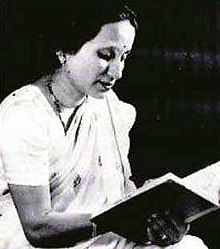Padma Gole (Marathi: पद्मा गोळे; 1913–1998) was a Marathi poet from Maharashtra, India born in patwardhan family of Tasgaon (District Sangli). She was one of the many women from rich Indian families who were emboldened by the Gandhian movement to become feminist writers.[1] Her poetry was heavily influenced by the writings of Ram Ganesh Gadkari, Tryambak Bapuji Thombre, and Yashwant Dinkar Pendharkar.[citation needed] Much of Padma's poetry depicts the domestic lives of Indian middle-class women.[2]
Padma Gole | |
|---|---|
 | |
| Born | 1913 Tasgaon, Sangli |
| Died | 12 February 1998 |
| Pen name | Padma |
| Occupation | Poet |
| Language | Marathi |
| Nationality | Indian |
| Citizenship | Indian |
| Relatives | Vinayakrao Patwardhan, Saraswatibai Patwardhan (parents) |
The following are the collections of her poems:
- Akashwedi (आकाशवेडी)
- Shrawan Megh (श्रावणमेघ)
- Pritipathawar (प्रीतिपथावर)
- Nihar ( निहार)
- Swapnata (स्वप्नता)
- Sakal
Personal life
editGole was second child of Shrimant Vinayakrao alias Babasaheb Patwardhan and Shrimant Saraswatibai Patwardhan. After Vinayakrao's death in 1923, her mother took all their children to Pune where all siblings took their education. Ms Gole had four siblings Shrimant Kamlini alias Taisaheb Peshawa (1911–1973), Parshuram Vinayakrao Patwardhan (1917–1989), Mangalmurti Vinayakrao alias Bhaiyyasaheb Patwardhan (1920–1980) and Kamalatai Bhave, Jabalpur/Mumbai.
References
edit- ^ Kanwar Dinesh Singh (2004). Feminism and Postfeminism: The Context of Modern Indian Women Poets Writing in English. Solan: Sarup & Sons. p. 38. ISBN 81-7625-460-6.
- ^ Sisir Kumar Das (2006). A History of Indian Literature: 1911-1956. New Delhi: Sahitya Akademi. p. 330. ISBN 81-7201-798-7.